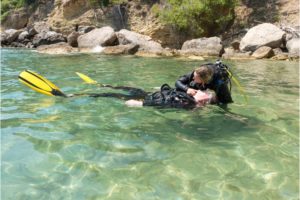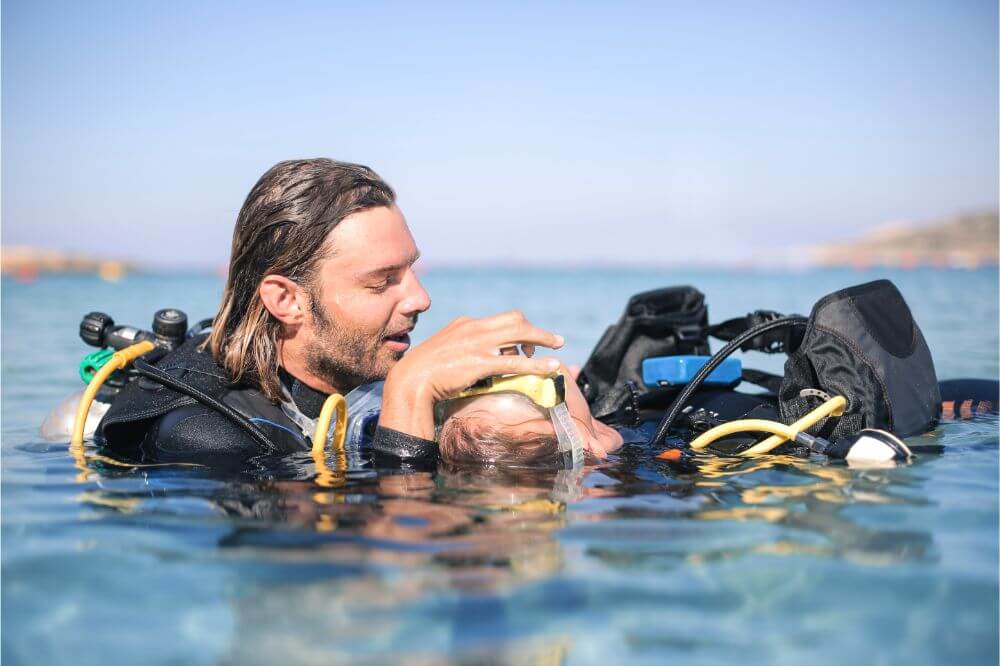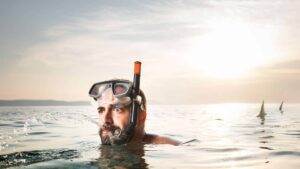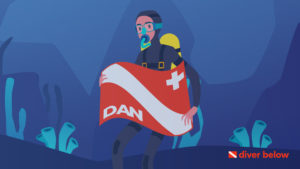There is no doubt that being a rescue diver is a very noble profession.
Not only do you get to save lives, but you also get to do what you love.
What could be better than that?
Although scuba diving is fun, being a rescue diver is serious business, and this means that you need to know what you are doing.
Not only do you need to know what you are doing, but you also need to have a certificate that proves as much.
This is what we are here to talk about today, becoming a rescue diver.
First, we’re going to cover the most critical aspects of becoming a rescue diver, such as what you need to do to get your certificate, what some of the prerequisites are, the average costs, how much time you will need to invest, and more.
Contents
- What is a Rescue Diver?
- What is a Rescue Diver Certificate?
- Who Provides Rescue Diver Certification?
- Prerequisites and Requirements for Taking a Rescue Diver Certification Course
- The Cost of a Rescue Diver Certification Course
- What You Will Learn in a Rescue Diver Course
- How Much do Rescue Divers Get Paid?
- Possible Continued Learning
- Wrapping Up
What is a Rescue Diver?
Before we go any further, it is probably good to know what a rescue diver is and what they do.
The main job of a rescue diver is to save people who are in distress on or underwater.
Rescue divers are often tasked with jumping from helicopters into stormy waters to rescue those on ships sinking or that have already sunk.
They may also be tasked with slightly more mundane jobs, such as retrieving items that have fallen overboard or off piers.
However, this is usually reserved for search and recovery divers.
What is a Rescue Diver Certificate?
Rescue diver is a specific type of scuba diving certification level provided by various agencies.
It signifies that the individual is knowledgeable and qualified to perform rescue diving activities, emphasizing diver rescue and emergency response.
Levels of Diving Certifications
There are various levels of scuba diving certifications.
This is important to know because you can’t just wake up one morning and decide to take a rescue diver certificate course.
There are five primary levels of diving certifications.
These include beginner, advanced rescue diver, dive guide, and diving instructor.
So, before you can obtain your rescue diver certificate, you first need to start with a beginner and then an advanced diving certificate.
Who Provides Rescue Diver Certification?
In North America, four leading agencies provide diving courses and certification programs.
These include PADI (Professional Association of Diving Instructors), SSI (Scuba Schools International), SDI (Scuba Diving International), and NAUI (National Association of Underwater Instructors).
Prerequisites and Requirements for Taking a Rescue Diver Certification Course
The prerequisites for rescue diver courses will depend on the course, but you are expected to have a few things under your belt.
For one, you will need to have either an open water or a junior open water diving certificate.
In addition, you may also need beginner and advanced diving certifications.
Moreover, you should also consult your physician because scuba diving is not for everybody.
In addition, there are various medications and chronic health conditions, as well as recent surgical procedures that may prevent you from being able to scuba dive, or at the very least, to qualify for a rescue diver certificate.
The Cost of a Rescue Diver Certification Course
On average, you can expect to spend from $275 to $400 for a rescue diver course.
Now, this will depend on the course and who is giving it.
Some are cheaper than others.
Keep in mind that you will also need scuba gear, so you will need to rent it if you don’t have your own.
Also, you will need to purchase a variety of rescue diver-related equipment.
On that same note, the cost of spending time with a diving instructor is usually not included.
These courses involve a written and a real-life training component with an instructor, and that costs money.
The time required to get your certificate should take between 7 and 14 days, depending on the course.

What You Will Learn in a Rescue Diver Course
Refer to the list below to find out what you will learn in an average rescue diver course.
Keep in mind that this list is not totally exhaustive.
- Diver stress
- self-rescue
- Emergency equipment
- Emergency Management
- Annex diver response
- Egress or exit
- In-water rescue breathing protocols
- Dive accident scenarios
How Much do Rescue Divers Get Paid?
Rescue diving is a profession, not just a hobby, and in fact, these people make a pretty decent living.
On average, you can expect to make around $55,000 annually as a rescue diver, with the more seasoned veterans potentially earning nearly $94,000 per year.
As you can see, although there is a bit of danger involved, it’s a well-paid profession.
Possible Continued Learning
After you attain your rescue diving certificate, you have the option to do continued learning.
For instance, you can then take a professional diver master course to become a role model, a more advanced scuba supervisor, a search and recovery course, and even an underwater navigation course.
Wrapping Up
Becoming a certified rescue diver takes a good deal of knowledge, skill, training, and preparation, so know what you’re getting into.





